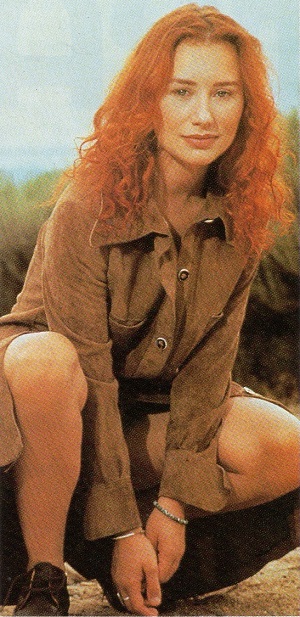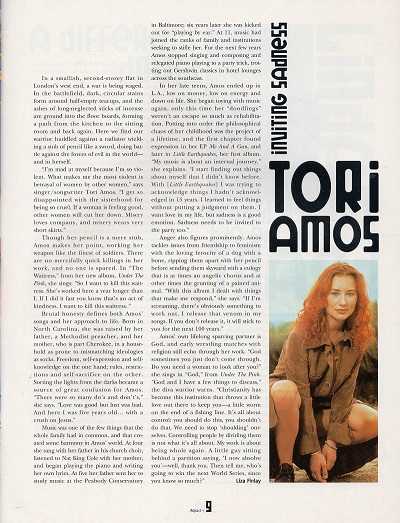|

songs | interviews | photos | tours | boots | press releases | timeline
Impact (Canada)
February 1994

Tori Amos
Inviting Sadness
by Liza Finlay
photo by Loren Haynes
In a smallish, second-storey flat in London's west end, a war is being waged. In the battlefield, dark, circular stains form around half-empty teacups, and the ashes of long-neglected sticks of incense are ground into the floor boards, forming a path from the kitchen to the sitting room and back again. Here we find our warrior huddled against a radiator wielding a stub of pencil like a sword, doing battle against the forces of evil in the world -- and in herself.
"I'm mad at myself because I'm so violent. What makes me the most violent is betrayal of women by other women," says singer/songwriter Tori Amos. "I get so disappointed with the sisterhood for being so cruel. If a woman is feeling good, other women will cut her down. Misery loves company, and misery wears very short skirts."
Though her pencil is a mere stub, Amos makes her point, working her weapon like the finest of soldiers. There are no mercifully quick killings in her work, and no one is spared. In "The Waitress," from her new album, Under the Pink, she sings: "So I want to kill this waitress. She's worked here a year longer than I. If I did it fast you know that's an act of kindness. I want to kill this waitress."
Brutal honesty defines both Amos' songs and her approach to life. Born in North Carolina, she was raised by her father, a Methodist preacher, and her mother, who is part Cherokee, in a household as prone to mismatching ideologies as socks. Freedom, self-expression and self-knowledge on the one hand; rules, restrictions and self-sacrifice on the other. Sorting the lights from the darks became a source of great confusion for Amos. "There were so many do's and don't's," she says. "Love was good but lust was bad. And here I was five years old... with a crush on Jesus."
Music was one of the few things that the whole family had in common, and that created some harmony in Amos' world. At four she sang with her father in his church choir, listened to Nat King Cole with her mother, and began playing the piano and writing her own lyrics. At five her father sent her to study music at the Peabody Conservatory in Baltimore; six years later she was kicked out for "playing by ear." At 11, music had joined the ranks of family and institutions seeking to stifle her. For the next few years Amos stopped singing and composing and relegated piano playing to a party trick, trotting out Gershwin classics in hotel lounges across the southeast.
In her late teens, Amos ended up in L.A., low on money, low on energy and down on life. She began toying with music again, only this time her "doodlines" weren't an escape so much as rehabilitation. Putting into order the philosophical chaos of her childhood was the project of a lifetime, and the first chapter found expression in her EP Me and a Gun, and later in Little Earthquakes, her first album. "My music is about an internal journey," she explains. "I start finding out things about myself that I didn't know before. With [Little Earthquakes] I was trying to acknowledge things I hadn't acknowledged in 15 years. I learned to feel things without putting a judgment on them. I want love in my life, but sadness is a good emotion. Sadness needs to be invited to the party too."
Anger also figures prominently. Amos tackles issues from friendship to feminism with the loving ferocity of a dog with a bone, ripping them apart with her pencil before sending them skyward with a eulogy that is at times an angelic chorus and at other times the grunting of a pained animal. "With this album I dealt with things that make me respond," she says. "If I'm screaming, there's obviously something to work out. I release that venom in my songs. If you don't release it, it will stick to you for the next 100 years."
Amos' own lifelong sparring partner is God, and early wrestling matches with religion still echo through her work. "God sometimes you just don't come through. Do you need a woman to look after you?" she sings in "God," from Under the Pink. "God and I have a few things to discuss," the diva warrior warns. "Christianity has become this institution that throws a little love out there to keep you -- a little worm on the end of a fishing line. It's all about control: you should do this, you shouldn't do that. We need to stop 'shoulding' ourselves. Controlling people by dividing them is not what it's all about. My work is about being whole again. A little guy sitting behind a partition saying, 'I now absolve you' -- well, thank you. Then tell me, who's going to win the next World Series, since you know so much?"
original article

[scan by Sakre Heinze]
t o r i p h o r i a
tori amos digital archive
yessaid.com
|